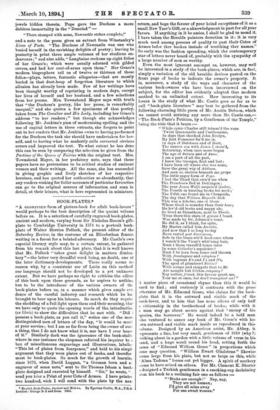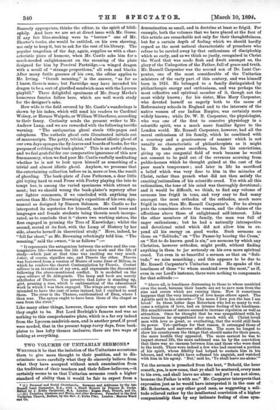BOOK-PLATES.*
" A GLORIFIED form of picture-book for adult book-lovers" would perhaps be the best description of the quaint volume before us. It is a selection of carefully engraved book-plates, ancient and modern, varying from Sir Nicholas Bacon's gift. plate to Cambridge University in 1574 to a portrait book- plate of Walter Herries Pollock, the present editor of the Saturday Review, in the costume of an Elizabethan fencer, waiting in a forest for a belated adversary. Mr. Castle's own especial literary style may, to a certain extent, be gathered from his remark about this last plate, that it is well known that Mr. Pollock "takes great delight in matters dimica- tory "—the latter very dreadful word being, no doubt, one of the later dictionary-developments. There really seems no reason why, by a consistent use of Latin on this method our language should not be developed to a yet unknown extent. But we have perhaps no right to criticise the edito: of this book upon these grounds, as he aspires to nothinp but to be the introducer of the various owners of dr:- book-plates before us, in a manner which gives ample evi- dence of the careful industry and research which he ha brought to bear upon his labonre. So much do they requir. the shedding of a full light upon them and their meaning, thal we have only to quote the opening words of the, introductio: (ex libris) to show the difficulties that he met with. "Did possess a book-plate, as you call it," writes one of the mos: distinguished men of letters of the day, "it would be num) at your service; but I am so far from being the owner of suei a thing, that I do not know what it is, nor have I ever hear( of it." Similarly dark was the ignorance of the book-stall:- where in one instance the shopman referred his inquirer to :. box of miscellaneous engravings and illustrations, labelle, "This lot of plates from fourpence," and held to his simpl argument that they were plates out of books, and therefor. must be book-plates. So much for the growth of learnin; since 1676, when David Loggan, "a German born and a: engraver of some note," sent to Sir Thomas 'sham a book- plate designed and executed by himself. "Sir," he wrote, 4. _ send you beer a Print of your Cote of Armes. I have printec two hundred, wich I will send with the plate by the flex English Book-Plates, Ancient and Modern. By Egerton Castle, 11..A., ECU.. London: George 13.11 and Sons. 1893.
return, and bege the favour of your keind excepttans of it as a
small New Yaer's Gift, or a aknowledgment in part for all your favors. If anything in it be althea, I shall be glad to mend it. I have taken the Heralds painters derection in it : it is very
much used among persons of quality to past their Cotes of Armes befor ther bookes instade of wreithing ther names."
So early was the fashion spreading, whieh the contemporary star of letters never heard of, probably with the sympathy of a large number of men as worthy.
Even the most ignorant amongst us, however, may well be interested in a study of the book-plates, which are, in fact: simply a variation of the old heraldic devices pasted on the front page of books to indicate the owner's property. it is, moreover, a study of the ways and character of the various book-owners who have been interviewed on the subject, for the editor has evidently adopted that modern
method to an unlimited extent. How interesting to its lovers is the study of what Mr. Castle goes so far as to call "book-plate literature" may best be gathered from the following charming little poem of Mr. Austin Dobson, which we cannot avoid noticing any more than Mr. Castle can,— " The Book-Plate's Petition, by a Gentleman of the Temple," being the title that it bears :— "While cynic Charles still trimm'd the vane 'Twixt Querouaille and Castlemaine, In days that shocked John Evelyn, My first Possessor fuc'd me in.
In days of Dutchmen and of frost, The narrow sea with James I cross'd,
Returning, when once more began
The age of Saturn and of Anne.
I am a part of all the past, I knew the Georges, first and last ; I have been oft where else was none,
Save the great wig of Addison,
And seen or. shelves beneath me grope
The little eager form of Pope.
I lost the Third that own'd me when The Frenchmen fled at Dettingen ; The year James Wolfe surpria'd Quebec,
The Fourth in hunting broke his neck ;' The Fifth one found me in Cheapside,
The day that William Hogarth died. This was a Scholar, one of those Whose Greek is sounder than their hose;
He lov'd old books and nappy ale,
So lived at Streatham, next to Thrale.
'Twas there this stain of grease I boast Was made by Dr. Johnson's toast. He did it, as I think, for spite,
My Master called him Jacobite.
And now that I so long to-day
Have rested post discrtmina, Safe in the brass-wir'd book-case whore
I watch'd the Vicar's whiening hair, Must I these travell'd bones inter
In some Collector's sepulchre? Must I be torn from home and thrown.
With frontispiece and colophon ? With vagrant A's and Fs and O's, The spoil of plundered Folios?
With scraps and snippets that to Me
Are naught but kitchen company ? Nay rather, friend, this favour grant me, Tear me at once, but don't transplant me I "
A. neater piece of occasional rhyme than this it would he :lard to find ; and curiously it contrasts with the prose itterance of Mr. Edmund Gosse, who claims for the book.
olate that it is the outward and visible mark of the 000k-lover, and to him that has none allows of only half L citizenship in the brotherhood of books ; while with it 1, man may go about secure against that "enemy of his species, the borrower." He would indeed be a bold man who ventured to annex any book of Mr. Gosse's with his ,wn outward and visible mark inside as reproduced in this volume. Designed by an American artist, Mr. Abbey, it represents a fine, but very small, gentleman of 1610 (why P) galking about in a garden with a little volume of verse in his sand, and a huge scroll round his head, setting forth the J ame of "Edmund William Gosse " in proportions which .lone may question. "William Ewart Gladstone" likewise 'ooms large from his plate, but not so large as this, while Alma Tadema " looms out yet bigger. A spirit of mockery :eems to have seized on others. For Mr. Clement K. Shorter
s designed a Turkish gentleman in a smoking-cap declaiming rom his book to a reclining fair one as follows :— . "Books are enough!' Nay, nay,
They are not human; I'd give all mine away For one sweet woman.* Scarcely appropriate, thinks the editor, to the spirit of bibli- ophily. And here we are set at direct issue with Mr. Gosse.
If any fair blue-stocking were to "borrow" one of Mr. Shorter's books, she would be entitled, on his own showing, not only to keep it, but to ask for the rest of his library. The popular tragedian of the day, again, supplies us with a char- acteristic piece of humour, when Mr. Castle asks him for a much-needed enlightenment on the meaning of the plate designed for him by Percival Partridge,—a winged dragon with a scroll of "strange proportions," all reds and blacks. After many futile guesses of his own, the editor applies to
Mr. Irving. "Occult meaning," is the answer, "as far as I know, there is none ; but Partridge may have intended his dragon to be a sort of glorified sandwich-man with the Lyceum playbill." Three delightful specimens of Mr. Stacy Marks's
humorous fancies follow here, which are well worth study for the designer's sake.
How wide is the field covered by Mr. Castle's wanderings is shown by his index, which will send his readers to Cardinal Wolsey, or Horace Walpole, or William Wilberforce, according to their fancy. Curiosity sends the present writer to Mr. Andrew Lang, and we are rewarded with the following terrific warning. "The antiquarian ghoul steals title-pages and colophons. The wsthetic ghoul cuts illuminated initials out of manuscripts. The petty, trivial, and almost idiotic ghoul of our own days sponges the fly-leaves and boards of books, for the purposeof cribbing the book-plates." This is an awful charge, and we feel grateful for our comparative ignorance of this new freemasonry, when we find poor Mr. Castle ruefully meditating whether he is not to look upon himself as something of a trivial and almost idiotic ghoul. Anyhow, we presume that the entertaining collection before us is, more or less, the result of ghouling. The book-plate of Jane Patterson, a dear little girl trying hard to read Prose with Poetry playing the lute to tempt her, is among the varied specimens which attract us most ; but we should wrong the book-plater's mystery after our lighter comments, if we concluded with anything less serious than Mr. Oscar Browning's exposition of his own sign. manual as designed by Simeon Solomon. Mr. Castle so far interpreted its mysteries for himself, mottoes and trees and languages and female students being therein much incorpo- rated, as to conclude that it "shows two working sisters, the first engaged in pruning the Tree of Knowledge ; whilst the second, seated at its foot, with the Lamp of History by her side, absorbs herself .in theoretical study." Here, indeed, he "fell far short," as Mr. Browning rebukingly told him. "The meaning," said the owner, "is as follows " :—
" It represents the antagonism between the active and the con- templative life—between the life of active work and the life of study—which just at that time was exciting me very much. labor, of course, signifies one, and Theoria the other. Theoria was borrowed from a version of Munro of some lines of Milton, in which he renders the cherub Contemplation by Theoria. Content ailieurs is an invention of my own, and represents the discontent following the above-mentioned conflict. It is modelled on the repos ailleurs of St. Aldegonde. The lamp and book are merely attributes of Theoria. You perceive that Labor is standing up, girt, pruning a tree, which is emblematical of the educational work in which I Ix as then engaged. The wings are my crest. We intended to have the coat of arms instead, but I omitted to send them. The river is the Thames, emblematical of Eton, where I then was. The spires ought to have been those of the chapel as seen from the river."
Like many other things, however, these spires were not what they ought to be. But Lord Burleigh's famous nod was as nothing to this comprehensive plate, which is a far cry indeed from the Lyceum sandwich-men, and is another proof, if proof were needed, that in the present topsy-turvy days, from book- plates to less lofty themes inclusive, there are two ways of looking at everything.







































 Previous page
Previous page